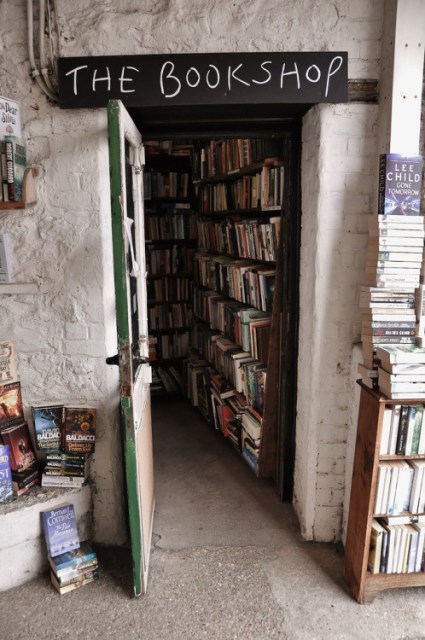Feature image via booksandpublishing.

Rainbow Boxes is a project to send queer YA books to libraries and shelters in every state.
Books featuring queer people of color from 2014 include Last Words of Montmartre by Qui Miaojin, Moving Forward Sideways Like a Crab by Shani Mootoo, Love Enough by Dionne Brand and more.
Beloved Montreal comics publisher (and bookstore) Drawn & Quarterly is turning 25 and it released an excellent celebratory anthology.
Sometimes books remind us of the places we read them: “It’s an ability I suspect many of us possess: besides plying our minds for the story’s plot, the characters’ names, and the themes presented, we can send ourselves back to where we were when we read the books we loved. Lately, I’ve been trying to pay even more attention to my journey as the reading of the book is taking place. What mark did the book leave on me, and in turn, what imprint did I impart?”
And at the LARB, Susan Barbour writes about travelling and reading about travelling, and how reading to get to know or experience a place has changedCity Secrets Paris.
Writing to get to know a place has also changed. Just don’t be Elizabeth Gilbert.
It’s fun to read about eating.
At Brain Pickings, Maria Popova discussed the potency of giving something a name, and how names lead to empathy, and naming leads to love: “To name a thing is to acknowledge its existence as separate from everything else that has a name; to confer upon it the dignity of autonomy while at the same time affirming its belonging with the rest of the namable world; to transform its strangeness into familiarity, which is the root of empathy. To name is to pay attention; to name is to love.”

Intense, focused reading is good for your brain.
Violette Leduc’s Thérèse and Isabelle has been censored since its 1955 publication (“It was the combination of her fierce independence and her fearless description of lesbian relationships that proved too uncomfortable for the male publishers of the time and too controversial for a greater audience.”) and the Feminist Press just released a new unexpurgated translation that adds to lesbian literary history.
Read Between the World and Me.
At Room, Jillian Tamaki and Mariko Tamaki discussed feminism, YA, creativity and more: “JILLIAN: I’ve never been pushed to emphasize the aspects [of race and gender] either, and yet, I feel like Windy [This One Summer] is a lesbian kid and she’s going to grow up to be a lesbian. It is part of her character, but it’s not something that we have to address and make a thing about. In that way I really appreciate just straight representation and not “DIVERSITY!” To just make an example of it, a positive example. It is not my interest to do any of that pedantic stuff.”
“Allowing teenagers who know nothing of great literature the power to determine what should be taught as great literature seems ill-considered.” On trying to trigger warning literature.
At the Toast, Sarah Jeong, author of The Internet of Garbage, discussed online harassment, free speech, how the Internet has always been trash and more.
We have constructed Joan Didion as a celebrity.
Danika from the Lesbrary now has a patreon!
What’s your favorite curse word? A breakdown, by state.
Don’t tell Charles Dickens your literary secret.
“The Pitch Meeting for Wishbone” is my favorite thing today.
At Lambda Literary, Sandra Lambert reviewed The Gods of Tango by Carolina de Robertis.
At Autostraddle, Mey wrote about Lumberjanes 16 and also how Lumberjanes won all the Eisners. In Hidden Gems of Queer Lit, Melanie wrote about Dreams of an Insomniac.

Coverage of the Coverage of the Harper Lee Coverage
Harper Lee’s Go Set a Watchman, her first book in 55 years that she maybe did not want to exist, has been released and is the subject of a lot of controversy. Stories about how it was found are really, really shady. Her editor probably would have hated it. It’s not going to make her a top-earning author for this year because of a technicality. The publication also means scientists decided to analyze Go Set a Watchman and To Kill A Mockingbird to see whether Harper Lee actually wrote them because when a woman writes something good she obviously can’t really have done it herself.
Reviewers are wondering whether it will ruin Mockingbird. (Mic has the first chapter if you want to feel it out. If you think it will and don’t want to read it, you can read ten quotations from it instead. Or skip it, it has verbatim Mockingbird passages anyway.)
Also Lee’s lawyer has maybe found a third book in a deposit box. The Onion has what is perhaps the most accurate coverage of all.

Book Things To Do In Person
July 24, San Francisco: Michelle Tea and Karolina Waclowiak are reading at Green Apple Books on the Park, 7:30.
July 31: Submissions (poetry, fiction, and non-fiction) for Polychrome Ink, from diverse authors and/or featuring diverse themes, are due.
August 1: “Editors David Levithan and Billy Merrell are searching for non-fiction entries to include in the upcoming expanded edition of The Full Spectrum, with an emphasis on diversity.”
August 15, Montreal: Queer between the Covers, Montreal’s annual queer book fair, is back! Centre communautaire de loisirs Sainte-Catherine d’Alexandrie (1700 Amherst Street), 11 am to 6 pm.
1 December: Submissions for Topside’s short speculative fiction anthology by trans writers are due.
Know of a queer event with literary merit? Send it to us! The Liberty Lit is bi-weekly.
Books! They are really great. You just won’t believe how great they are. You may think that the Internet’s great, but that’s just peanuts compared to books. In Lez Liberty Lit, we talk about literary shit that’s happening that you should probably care about.
The name “Liberty Lit” was inspired by the short-lived literary journal produced by Angela Chase at Liberty High School in 1994.








Comments
Rainbow Boxes is such a great idea! Thanks for sharing!
Thank you so much for linking my Patreon! Just so people know, if you donate $2 or more, you get entered to win a lesbian/queer women book every month!
Is it weird that all the images of books remind me of the lesbosexy posts…Librasexy? I will take all of the books please, and if they happen to come with a cosy well lit forest castle to read them in, even better.
Oh, I don’t think it’s weird. Libraries and bookstores are incredibly seductive. Why else do you think I’m converting my bedroom little by little into a personal library?
Well, besides the fact that I’m trying to leave some space for my roommates in the living room, and that my books make my apartment more of a home.
I love this column so much! I look forward to reading it every time I see it, and I am always led on an awesome rabbit trail of interesting things.
I just finished Watchman, and I thought it was worth reading. Some of the characters and major plot points in Watchman don’t line up at all with Mockingbird, so it’s important to remember that it’s a stand-alone book, not a sequel. It’s not as good, but definitely worth your time.
Glad to see some more positive commentary coming through about it. I’m definitely going to read.
is anyone else tired of those think-pieces about trigger warnings? condescending, inaccurate, lacking creativity and faith in students…yawn.
Yeah, I was thinking as I read it that the author seemed unnecessarily condescending and combative.
He also implied that applying trigger warnings to books is equivalent to censoring them/removing them from the curriculum entirely, which doesn’t have to be the case for all literature with such warnings.
yeah, exactly! I feel like the whole point of content warnings is to help more students be able to engage the material. which is like, the opposite of censorship.
And like, didn’t this used to not be a thing? When I was in high school the lit teacher would usually give us a verbal heads-up about content and it was not a big deal. Or was it just my Catholic HS?
In the case he was centring his argument around though, that was what happened! The trigger warning discussion led to Ovid not appearing in the curriculum.
I really didn’t like that article. The tone was /so/ condescending and arsehole-y, and just tried to make fun of the whole concept of trigger warnings. Like Rie was saying, there should be at least a warning given my the teacher/professor to the students, if not in the actual curriculum description of the texts.
“Just don’t be Elizabeth Gilbert.” OMG thank you
The article on trigger warnings really bothered me. It classifies such labels as the work “over-sensitive” and “underdeveloped” minds; it calls them needless while working from a place that seems privileged (and sheltered in its own way)in its ability to be unaffected by assault, violence, sexism, and racism. The point of trigger warnings isn’t to rework the literary canon into something sanitized. These horrors are all part of our reality and thus must come into our literature for us to examine them and deal with them critically. But to call warnings themselves unnecessary is simply untrue and speaks to the disregarding attitude that many still approach mental illness with today. I struggled with severe depression for years. Suddenly coming across a graphic depiction of suicide on film or in books would cause my mind to fixate endlessly on it and generally led to further self-destructive planning or self harm. Without warnings, there was no way to decide for myself what I could handle at that moment and what to come back to at a safer time. There was no way to even steel myself before reading distressing passages. Even though I personally almost never need them anymore (yay recovery- 3 years now), I appreciate trigger warnings whenever I see them because they’re a sign someone took the time to consider the ways their depiction might affect the reader and gave the reader the information and power to make their own choices if necessary to protect their safety.
Thank you so much! I totally agree with your comments about the article, and the need for content warnings.
Unicorn chaser for that trigger warning piece: http://slatestarcodex.com/2014/05/30/the-wonderful-thing-about-triggers/
“Trigger warnings fight those who would like to be our masters in another way as well. They are one of our strongest weapons against the proponents of censorship. The proponents say “We can’t let you air that opinion, it might offend people.” Trigger warnings say “I am explaining to you exactly how this might offend you, so if you continuing listening to me you have volunteered to hear whatever I have to say, on your own head be it, and let no one else purport to protect you from yourself.””
Like I am definitely not on board with the author’s criticisms of the social justice movement, but I like the solutions given.
the wishbone piece is amazing.
the day when wishbone gets put on UK netflix will be the happiest day of my life
I just can’t with Watchman. I’ve come to a place where I don’t believe I have the right to art, & I find it hard now to knowingly partake of something unfinished or something the creator didn’t want shared. I’ve lost track of how many times I’ve reread Patrick O’Brian’s Aubrey-Maturin series, for example, but I’ve never read the unfinished but posthumously published 21. It is just wrong for me.
I did like Alyssa Rosenberg’s idea of culture carbon offsets, though, where when you partake of media you’re uncomfortable supporting, you make a donation to an organization to counterbalance it. She first talked about it with donating to queer orgs to offset tickets to Ender’s Game, and now with elder rights orgs for Watchman. Link! I think it’s a great idea (if you’re in a financial position to do it, obviously). I’ve definitely made filmgoing decisions in the past that might have benefitted from a little offsetting, & I’m sure it’ll happen again.
Thanks for writing about the Harper Lee sitch. It’s made me feel really uncomfortable, but also confused about all the people who have been all like “Atticus turns into a racist?!” given that Watchman was written before Mockingbird, so clearly — like you said — not a sequel.
Loved the Brain Pickings article about naming things. It reminded me of Orwell’s 1984, which came to the same conclusion in the opposite manner, as ideas/things/history would be erased so that the people couldn’t talk about them or even have a way to conceptualize them, because their words (about the ideas/things/history) were obliterated.
Yes, this much!
Love this column, as always!!
@carolyn, I wanted to plug this queer book tumblr I recently was pointed to. You should check it out! It is AWESOME and I don’t know how I didn’t know about it before:
http://queerbookclub.tumblr.com/
Thank you!
Also YES I LOVE QUEER BOOK CLUB SO MUCH